Michelle Worthington's Blog, page 22
December 2, 2015
The Rules of Giving - Books make great gifts!
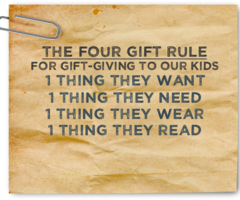
Is it just me or does it get harder every year to buy Christmas presents for the kids?When they were little, a quick trip to the junk shop would suffice to fill up the Santa stocking and maybe a big present for under the tree. Now that my boys are tweenagers, there is a written list with specific instructions on what to buy that totals three times my annual salary!Being a budget savvy super-Mum, I have taught my boys the value of money, saving and sacrifice. It seems they have seasonal amnesia around Christmas and birthdays.Apparently, Santa doesn't have a budget, since he makes all the toys himself and pays his elves in fairy floss; or so my boy tells me...I stumbled upon the four gift rule about 3 years ago, and I live by it. I choose one thing from the list, one thing I know they need, Mrs Claus buys them a Christmas outfit or new swimming togs and they get a set of books.I would love to know how you keep the spirit of Christmas alive, without donating a kidney to fund it.Go to my facebook page and share your story.www.facebook.com/michelleworthington.authorMerry Christmas!www.michelleworthington.com
Published on December 02, 2015 08:00
December 1, 2015
24 Bedtime Stories until Christmas

My amazing friend Laura shared this idea with me. She wraps up 24 Christmas stories, some new and some old family favourites and numbers them 1 to 24. Every night in December leading up to Christmas Eve, her boys get to find the present with the number on it, open it up and they all read it together as a family. It's a great alternative to chocolate advent calendars, especially for children with allergies and great for reluctant readers as it is exciting, social and gift related. The books aren't expensive to purchase from retail stores, but maybe you could find a Christmas story by a local author and have it personally signed to open on Christmas Eve? A trip to your local market or independent bookstore should point you in the right direction for a beautiful book filled Christmas.

www.michelleworthington.com
Published on December 01, 2015 08:00
November 30, 2015
Why kids don't care about bedtime stories
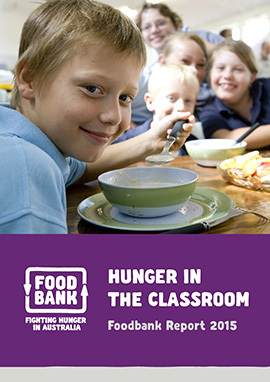
According to the teachers surveyed by the Hunger in the Classroom Foodbank Report 2015, over two thirds of students who miss out on breakfast can find it difficult to concentrate (73%) or can become lethargic (66%), with over half experiencing learning difficulties (54%) or exhibiting behavioural problems (52%). However, it is not just the children themselves who are affected, with an overwhelming number of teachers (82%) claiming that their workload increases when they have hungry and distracted students in their classroom. 35% of teachers also report that students coming to school hungry or without breakfast are more likely to be late and 29% report they are absent from school more frequently. The overwhelming consensus from teachers surveyed (95%) is that coming to school hungry impacts students’ abilities to reach their full potential both in and outside of the classroom.
 In March 2015, the Prime Minister described domestic violence as a ‘tragic and deadly epidemic’. Relationships Australia says children who live in homes where there is domestic violence grow up in an environment that is unpredictable, filled with tension and anxiety and dominated by fear. This can lead to significant emotional and psychological trauma, and getting through each day is the main objective so there is little time left for fun, relaxation or bedtime stories.We can no longer say these children are the minority. Many people I know who work in schools are trying to deal with this epidemic out of their own pockets and in their own time. It is a national responsibility to the next generation of Australians.When literacy experts continue to preach the age old adage of the importance of bedtime stories, let us remind them of the importance of breakfast and a safe place to call home. These problems need to be addressed by our government before any further funding is allocated to archaic blanket testing of students and literacy policy.If you would like to find out more information about the Breakfast in Schools program, follow this linkhttp://www.healthyfoodforall.com.au/school-breakfast-program/If you are experiencing domestic violence, please contact http://www.rizeup.com.au/If I can help in any way, please don't hesitate to contact me. talk soonMichellewww.michelleworthington.com www.michelleworthington.com
In March 2015, the Prime Minister described domestic violence as a ‘tragic and deadly epidemic’. Relationships Australia says children who live in homes where there is domestic violence grow up in an environment that is unpredictable, filled with tension and anxiety and dominated by fear. This can lead to significant emotional and psychological trauma, and getting through each day is the main objective so there is little time left for fun, relaxation or bedtime stories.We can no longer say these children are the minority. Many people I know who work in schools are trying to deal with this epidemic out of their own pockets and in their own time. It is a national responsibility to the next generation of Australians.When literacy experts continue to preach the age old adage of the importance of bedtime stories, let us remind them of the importance of breakfast and a safe place to call home. These problems need to be addressed by our government before any further funding is allocated to archaic blanket testing of students and literacy policy.If you would like to find out more information about the Breakfast in Schools program, follow this linkhttp://www.healthyfoodforall.com.au/school-breakfast-program/If you are experiencing domestic violence, please contact http://www.rizeup.com.au/If I can help in any way, please don't hesitate to contact me. talk soonMichellewww.michelleworthington.com www.michelleworthington.com
Published on November 30, 2015 08:00
November 27, 2015
Interview Opportunity in 2016: call out for children's authors, picture book illustrators and kidlit event co-ordinators
 This is an opportunity for picture book artists, children's authors and kidlit conference co-ordinators to promote a project or writing event by booking an interview on my blog and shared via my social media platform to a broader audience. Even if you are not yet published but have a cause you would like to raise awareness for, I am happy to offer you an interview in 2016. If you are interested please contact me at mworthington.author@gmail.com and I will send you more details.
This is an opportunity for picture book artists, children's authors and kidlit conference co-ordinators to promote a project or writing event by booking an interview on my blog and shared via my social media platform to a broader audience. Even if you are not yet published but have a cause you would like to raise awareness for, I am happy to offer you an interview in 2016. If you are interested please contact me at mworthington.author@gmail.com and I will send you more details. Looking forward to helping you promote upcoming and established talent via social media in 2016.
Talk soon
Michelle
www.michelleworthington.com
www.michelleworthington.com
Published on November 27, 2015 18:35
November 26, 2015
Why it's important to read to premmie babies in NICU
 Just like touch being a healing quality for premature babies in the NICU, so is hearing their parents voices. Reading to your baby can be a beautiful way to bond and connect, with the book becoming a treasured keepsake. For my first premmie baby, I read him The Hobbit. For my second premmie baby, we read the Laura Ingles Little House on the Prairie series. The nurses loved it!
Just like touch being a healing quality for premature babies in the NICU, so is hearing their parents voices. Reading to your baby can be a beautiful way to bond and connect, with the book becoming a treasured keepsake. For my first premmie baby, I read him The Hobbit. For my second premmie baby, we read the Laura Ingles Little House on the Prairie series. The nurses loved it!When Tom was in hospital, my hands and voice shook too much most of the time to read, so his Daddy sang him songs and when he got to special care, I could muster enough nervous energy to crochet a rug and talk to him about the stories I was making up in my head. That's how the book, My Brother Tom, was written, by his side at the Mater Mothers Hospital.
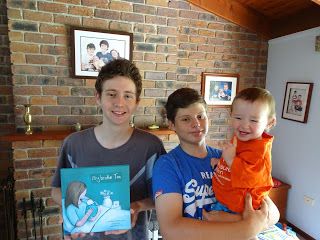
Life's Little Treasures has an amazing in hospital reading program. You can find more details here:
http://www.lifeslittletreasures.org.au/prematurity/information-for-professionals/book-n-bubs-hospital-reading-program/
Just like it is never too early to start reading bedtime stories to a child, it is never to early to start reading to your premmie, when you feel you can. They love to hear your voice. You are making a difference by your presence, your voice and your touch.
Please feel free to contact me if you would like to discuss more.
Talk soon,
Michelle
www.michelleworthington.com
www.michelleworthington.com
Published on November 26, 2015 08:00
November 25, 2015
Tips to help children with learning or behavioural disorders enjoy reading
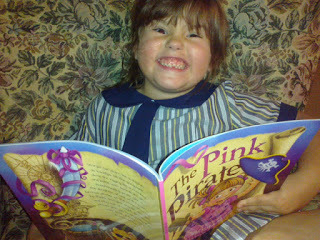 Children with learning and behavioural disorders, like my sons and niece, are notoriously reluctant readers. They have trouble integrating sensory input and reading involves more senses than you realise: the size and shape of the book, the colours, the type, the feel of the cover and the pages, the way the words on the page are read aloud and the need to be stationary in order to decipher the code they call reading.
Children with learning and behavioural disorders, like my sons and niece, are notoriously reluctant readers. They have trouble integrating sensory input and reading involves more senses than you realise: the size and shape of the book, the colours, the type, the feel of the cover and the pages, the way the words on the page are read aloud and the need to be stationary in order to decipher the code they call reading.Consider a child who struggles with sensory processing when it comes to reading
Unless it is a well known book, the fact the words are unknown can be unnervingMay be distracted by background noises Doesn't like the close proximity of the reader to the child Wanting to read the pages out of order
Tips to help
Let them touch the book before you start reading. It might take a couple of tries or you might like them to select their own book. Establish a comfortable personal space Be slow and deliberate in your movements, especially when turning the page and pointing to words Keep your voice low and calm, limiting expression to what is needed for understanding Look at the pictures in the book first before going back and reading the words. Allow fidgety behaviour and if the child is unable to sit still, stand up and walk around while reading
Sensory issues can affect daily functioning in young children but with the right strategies introduced as early as is appropriate for each individual child, they can come to see books as a source of enjoyment, a place of knowledge and they too can become life long readers.
If you would like to talk more about SPD and reading, please contact me.
Talk soon
x Michelle
www.michelleworthington.com
www.michelleworthington.com
Published on November 25, 2015 08:00
November 24, 2015
Tips to help children with anxiety read aloud at school
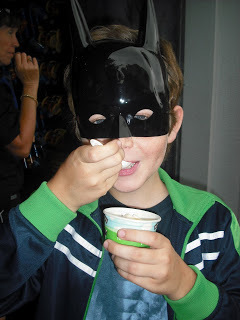 My 'reluctant reader' was struggling with reading at school, yet at home he was devouring books well above his reading age. Something didn't add up, and he finally told me he could easily read the books at school in his head, but he hated reading them aloud with everyone listening to him. When he did read, it was in a dull, flat, monotone voice and he also read very quickly and quietly because he didn't like the way his voice sounded out loud and with expression. I had read him bedtime stories from the day he was born, and I always read with bravado and silly voices (it's what I do) and he loved it. He loved being read to, he loved reading, he just didn't like reading aloud.
My 'reluctant reader' was struggling with reading at school, yet at home he was devouring books well above his reading age. Something didn't add up, and he finally told me he could easily read the books at school in his head, but he hated reading them aloud with everyone listening to him. When he did read, it was in a dull, flat, monotone voice and he also read very quickly and quietly because he didn't like the way his voice sounded out loud and with expression. I had read him bedtime stories from the day he was born, and I always read with bravado and silly voices (it's what I do) and he loved it. He loved being read to, he loved reading, he just didn't like reading aloud.The great thing about anxious kids having to read aloud is they don't have to do it forever. Once they get into older grades, reading once again becomes a solitary, quiet thing and when he got to this stage, his confidence and his marks skyrocketed.
Here are the tips we used to get him through reading aloud in junior school.
Tip 1. Practice at home, reading to the wall.
When you get to school, focus on the wall behind the people you are reading to and read to it instead
Tip 2. Every time you see a full stop, it means to stop and take a breath.
Children with anxiety tend to hyperventilate in stressful situations, remembering to breathe is very important. It also helps to slow down the reading.
Tip 3. Talk to the teacher, they need to know.
So many anxious children hide their problems at school. They fly under the radar and avoid confrontation or asking for help. Many parents don't like to admit they have anxious children, especially if they are socially awkward themselves, preferring to deal with it privately at home. Keep your teacher informed about your child's anxiety levels in a discrete and mindful way so they can be another ally in the fight against anxiety. They might have great tips they can share with you!
It does get better. With the right help, anxious children can learn to cope with strategies and patience.
If you would like to talk more about your anxious child, please feel free to contact me.
Talk soon
x Michellewww.michelleworthington.com
Published on November 24, 2015 08:00
November 23, 2015
How to introduce books to children with SPD
My youngest son, Tom, was born at 28 weeks. He has recently been diagnosed with Sensory Processing Disorder. He doesn't play well with others, he doesn't watch TV and he doesn't read books. As a picture book author, this just about breaks my heart. So, I have been working with his OT and his daycare to find some age appropriate, sensory friendly ways to help him discover and embrace the magic of books.
Firstly, the size of the book bothers him, bigger is not always better. He will open the book to a page but won't allow or initiate page turning. He doesn't like being read to with the book in front of him, but will listen if I am behind.
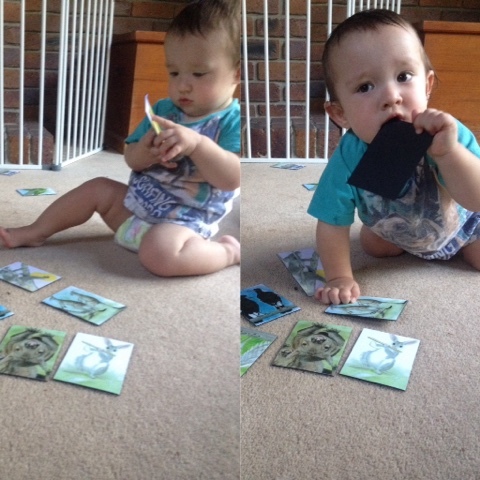
The best thing I have found is making small flash cards using illustrations from books about things he recognises. Although photocopies of books are illegal, being its my book and I asked the illustrator for permission, it should be ok. They are small enough for him to hold in one hand, mounted on black cardboard and without much white space. He picks them up and I turn to the corresponding page of the book. Our record reading time is 2 minutes 40 seconds, we are working on it.
Flash cards have been used for non-verbal children for a long time and I feel they also have a place for children with SPD. I hope publishers can offer more books with corresponding flash cards for special needs children so they can also develop a life long love of reading.
If you would like any flash cards for my books, please contact me and I will be sure to pass on our request to my publishers. It only takes a small movement of like minded people to make the world a better place.
Talk soonX Michelle www.michelleworthington.com www.michelleworthington.com
Firstly, the size of the book bothers him, bigger is not always better. He will open the book to a page but won't allow or initiate page turning. He doesn't like being read to with the book in front of him, but will listen if I am behind.

The best thing I have found is making small flash cards using illustrations from books about things he recognises. Although photocopies of books are illegal, being its my book and I asked the illustrator for permission, it should be ok. They are small enough for him to hold in one hand, mounted on black cardboard and without much white space. He picks them up and I turn to the corresponding page of the book. Our record reading time is 2 minutes 40 seconds, we are working on it.
Flash cards have been used for non-verbal children for a long time and I feel they also have a place for children with SPD. I hope publishers can offer more books with corresponding flash cards for special needs children so they can also develop a life long love of reading.
If you would like any flash cards for my books, please contact me and I will be sure to pass on our request to my publishers. It only takes a small movement of like minded people to make the world a better place.
Talk soonX Michelle www.michelleworthington.com www.michelleworthington.com
Published on November 23, 2015 08:00
November 20, 2015
The Pink Pirate by Michelle Worthington and Karen Mounsey-Smith, an empowering picture book for girls
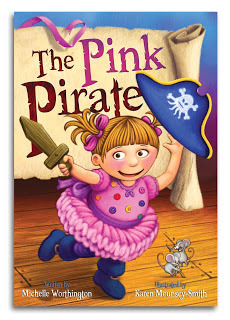 Georgia wants to be a pirate captain, like her father, but he says she should stay below deck when the real pirate fun begins. She proves that you can do anything, as long as you believe in yourself, and the power of pink
Georgia wants to be a pirate captain, like her father, but he says she should stay below deck when the real pirate fun begins. She proves that you can do anything, as long as you believe in yourself, and the power of pink
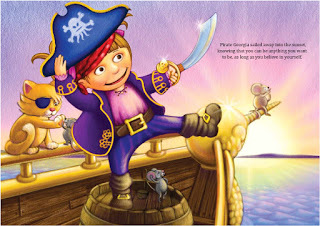 Available at www.michelleworthington.com www.michelleworthington.com
Available at www.michelleworthington.com www.michelleworthington.com
Published on November 20, 2015 08:00
November 19, 2015
Tips to help the parent of a 'boy who doesn't enjoy reading.'
Two out of three of my boys are reluctant readers. Here is an interview I did with my middle son.
Tip 1: Keep a steady supply of new books coming into your home.
- Getting books from the library is a better way than buying to establish which books your child enjoys reading, but once you have found them, buy them so the child as access to them whenever they feel like reading. Ask any school librarian and she will tell you that she has to keep a steady supply of new books on the shelves to appeal to reluctant readers.
Tip 2: Connect books to your child's interests e.g. movies or games.
- Whether you offer to let your child see the movie version or play the related video game of a book before or after reading the book, this multimedia approach has been proven to promote reading. They might not be literary classics, but reading is reading, even if it is from a gaming magazine.
Tip 3: Don't force the issue
- It will be hard enough getting them to read the required books for school homework without a battle of sighs and eye rolling with the potential for foot stamping, even door slamming, depending on the level of dread. Reading is meant to be for enjoyment. If they see you reading, they may be more inclined to pick up a book for recreation.
It won't be easy, but it only takes one book, the right book, for a boy to fall in love with reading.
Talk soon
x Michelle
www.michelleworthington.com
www.michelleworthington.com
Published on November 19, 2015 08:00



